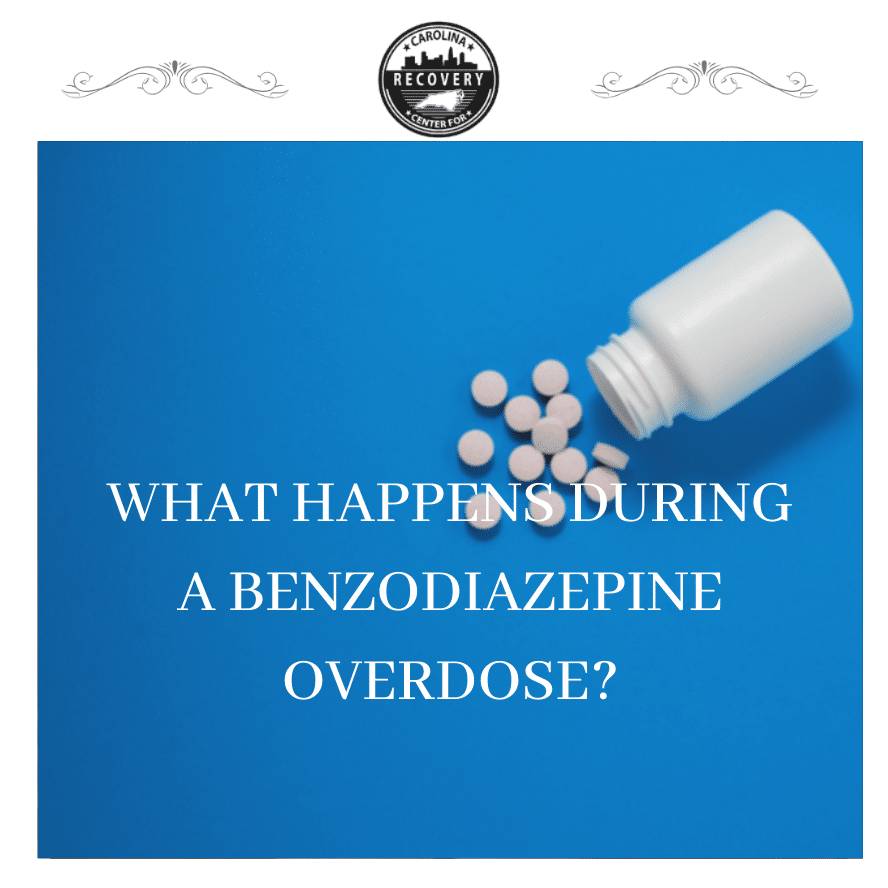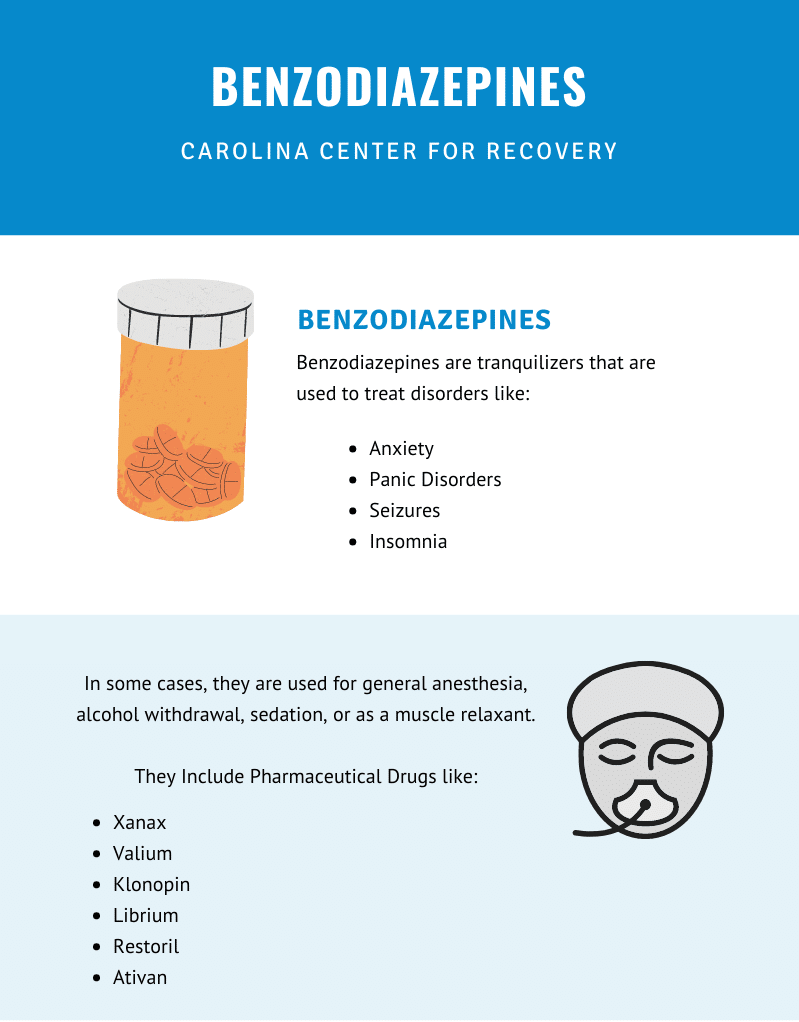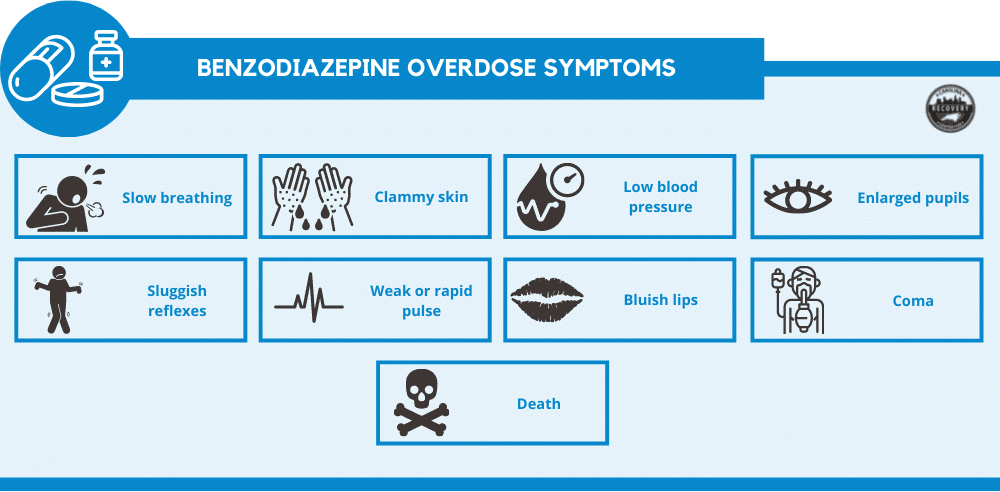What Happens During a Benzodiazepine Overdose?

Medically Verified: 2/1/24
Medical Reviewer
Chief Editor

All of the information on this page has been reviewed and verified by a certified addiction professional.
When used medicinally and under the direction of a doctor, benzodiazepines are generally safe and well-tolerated. However, when taken in large amounts or in combination with other substances, benzodiazepine abuse produces life-threatening effects, including benzodiazepine overdose.
Benzodiazepines are prescription medications used in the treatment of anxiety and sleep disorders as well as seizure disorders. Benzodiazepines, or “benzos”, work by slowing down the central nervous system. These medications are beneficial and safe when used as directed.
While benzodiazepines are helpful medications, these drugs have a high potential for abuse. As a result, many individuals take too much of a certain benzodiazepine or mix it with a different substance in order to produce a “high”. In doing so, these individuals are at risk of coma, respiratory depression, and death. Unfortunately, benzodiazepine overdose is fairly common. In fact, benzodiazepine related overdoses rose from 1,135 in 1999 to 11,537 in 2017. Consequently, it is important to be educated on the symptoms and effects of benzodiazepine overdose so more lives may be saved. If you or a loved one are experiencing a benzodiazepine overdose, call 911 or poison control immediately.

Symptoms of Benzodiazepine Overdose
If you or a loved one suffer from addiction to benzodiazepines, it is important to be able to recognize the signs of overdose. Being educated on these matters allow for proper overdose prevention as well as the ability to intervene before an overdose becomes deadly. One of the critical signs of benzo overdose is excessive sedation. Someone overdosing on benzodiazepines may be extremely hard to wake up. Additionally, they may have trouble standing and balancing, resulting in frequent falls. While some people display mental confusion and slurred speech, vital signs are often normal.
Other signs and symptoms of benzodiazepine overdose include:

- Slow or shallow breathing
- Clammy skin
- Low blood pressure
- Enlarged pupils
- Sluggish or depressed reflexes
- Weak or rapid pulse
- Bluish lips
- Coma
- Death
In addition, individuals suffering from an overdose may display symptoms opposite of the drug’s typical effects. For example, the individual may excited, agitated, or talkative rather than sluggish, fatigued, and calm. This reaction is referred to as a “paradoxical” reaction and occurs in less than 1 percent of patients.
Among children, the primary symptom of a benzo overdose is referred to as ataxia. Ataxia is characterized by a loss of balance or unsteady movements, causing the child to almost appear drunk. This symptom occurs in 90 percent of adolescent overdose patients.
Risk Factors for a Benzodiazepine Overdose
Benzodiazepine overdoses rarely result in death. However, when an individual mixes benzos with another substance, overdoses are more likely to turn fatal. Individuals who are addicted to benzos are at a higher risk for benzodiazepine overdose. This is because they are more likely to consume dangerous amounts of benzos and mix them with other substances like alcohol. Additionally, there are a number of other overdose risk factors, including a person’s weight, genetics, and age.
Mixing Benzos with Alcohol or Opioids
When an individual mixes a benzodiazepine with alcohol, they significantly increase their risk of overdose. Additionally, mixing benzos with opioid painkillers, cough medicines, and other central nervous system depressants can lead to profound sedation, breathing trouble, or death.
In 2018, The New England Journal of Medicine reported that approximately three-quarters of deaths involving benzodiazepines also involved opioids. Unfortunately, the risk of mixing benzodiazepines with opioids or alcohol has become so significant that companies are required to add a warning label on benzodiazepine and opioid prescriptions.
Benzo Overdose and the Elderly
Unfortunately, the elderly are at a higher risk for benzodiazepine overdose when compared to the general population. As individuals age, they begin to experience physical changes that can slow the body’s ability to metabolize drugs. As a result, elderly individuals abusing benzos may experience a buildup of the substance within their bodily systems.
Additionally, elderly individuals have higher sensitivity in regard to their brain’s benzodiazepine receptors. This can cause more intense benzodiazepine side effects, such as sedation, unsteadiness, and memory loss. As a result, even tiny doses of benzos can cause extreme confusion in elderly individuals.
Benzodiazepine Overdose Treatment and Prevention
Benzodiazepine overdose can be treated and reversed if caught in time. In some cases, flumazenil, a benzo antidote, may be administered in order to reverse an overdose. However, this medication is only used for individuals who are not physically addicted to benzodiazepines. This is because individuals who are administered flumazenil and are dependent upon benzos can go into immediate withdrawal. Benzodiazepine withdrawal can cause seizures, therefore, administering flumazenil must be done carefully. On the other hand, most benzodiazepine overdoses are treated through supportive care. Patients will be closely monitored until the toxic effects of the drug fade. However, in severe cases, patients will require respiratory support or mechanical ventilation due to symptoms of respiratory depression.
Accidentally overdosing on benzodiazepines can cause a much-needed wake-up call. If you or a loved one are addicted to or abusing benzos, treatment will help you overcome it. Oftentimes, attending addiction treatment for benzodiazepine abuse can lead to the development of a healthy, happy, and drug-free life. However, benzodiazepines are highly addictive and cause severe withdrawal symptoms once the user quits ingesting the substance. Due to this, attending a medical detox center is typically vital for one’s safety. Attending a detox center allows patients to receive relief from withdrawal symptoms, increasing their retention during treatment programs. After completing detox, drug rehab provides patients with the proper education and support they need in order to achieve long-term sobriety. If you or a loved one are suffering from an addiction to benzos, give us a call today and prevent a fatal overdose from occurring due to further substance abuse.

